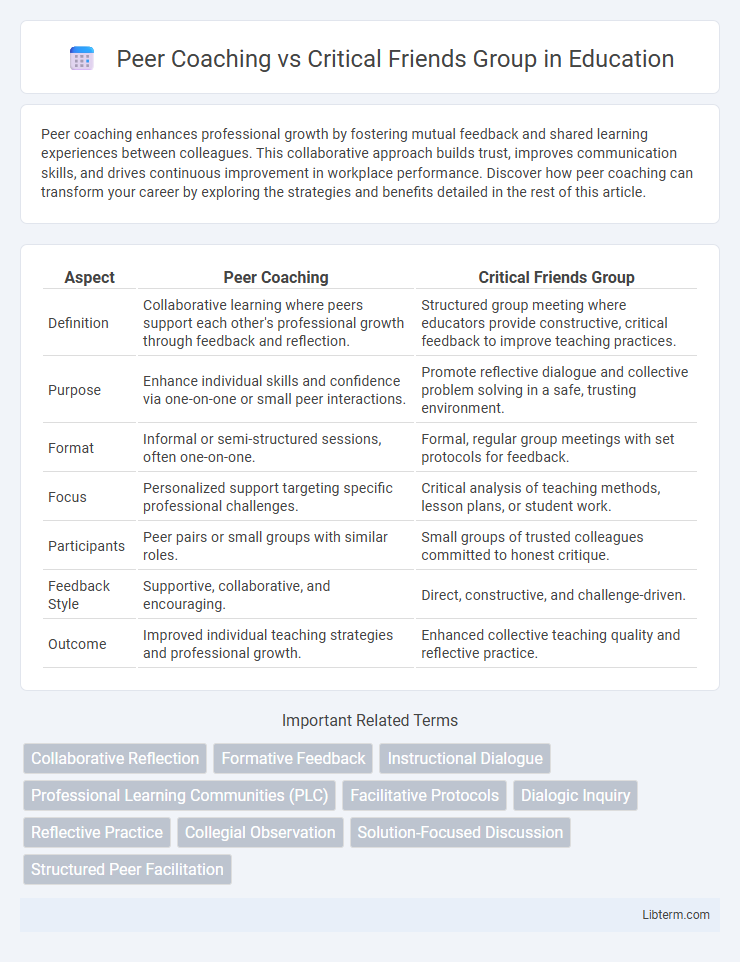Peer coaching enhances professional growth by fostering mutual feedback and shared learning experiences between colleagues. This collaborative approach builds trust, improves communication skills, and drives continuous improvement in workplace performance. Discover how peer coaching can transform your career by exploring the strategies and benefits detailed in the rest of this article.
Table of Comparison
| Aspect | Peer Coaching | Critical Friends Group |
|---|---|---|
| Definition | Collaborative learning where peers support each other's professional growth through feedback and reflection. | Structured group meeting where educators provide constructive, critical feedback to improve teaching practices. |
| Purpose | Enhance individual skills and confidence via one-on-one or small peer interactions. | Promote reflective dialogue and collective problem solving in a safe, trusting environment. |
| Format | Informal or semi-structured sessions, often one-on-one. | Formal, regular group meetings with set protocols for feedback. |
| Focus | Personalized support targeting specific professional challenges. | Critical analysis of teaching methods, lesson plans, or student work. |
| Participants | Peer pairs or small groups with similar roles. | Small groups of trusted colleagues committed to honest critique. |
| Feedback Style | Supportive, collaborative, and encouraging. | Direct, constructive, and challenge-driven. |
| Outcome | Improved individual teaching strategies and professional growth. | Enhanced collective teaching quality and reflective practice. |
Understanding Peer Coaching: Definition and Purpose
Peer coaching is a collaborative learning process where colleagues engage in ongoing dialogue to enhance professional skills, offering mutual feedback and support. Its purpose centers on fostering reflective practice and continuous improvement through trust and shared goals. In contrast, a Critical Friends Group functions as a structured peer review system emphasizing critical analysis and constructive critique to drive educational growth.
What is a Critical Friends Group?
A Critical Friends Group is a collaborative professional learning community where educators provide constructive feedback to improve teaching practices and student outcomes. Unlike Peer Coaching, which often involves one-on-one partnerships, Critical Friends Groups emphasize group dialogue, reflection, and shared accountability among members. These groups foster trust, encourage honest critique, and promote continuous professional growth through structured protocols and evidence-based discussions.
Key Differences Between Peer Coaching and Critical Friends Group
Peer Coaching involves a structured one-on-one or small group interaction focused on individual professional development and skill enhancement through reciprocal feedback. Critical Friends Group operates as a collaborative team where members critically analyze each other's work to improve group outcomes and foster collective accountability. The key difference lies in Peer Coaching's emphasis on personalized growth versus Critical Friends Group's focus on collective critique and shared problem-solving.
Benefits of Peer Coaching in Professional Development
Peer coaching enhances professional development by fostering personalized feedback and tailored growth strategies, promoting continuous skill improvement and self-awareness among educators. This collaborative approach encourages reflective practice and accountability, leading to increased confidence and instructional effectiveness. Unlike Critical Friends Groups, peer coaching offers direct, one-on-one support that accelerates meaningful professional learning and career advancement.
Advantages of Participating in a Critical Friends Group
Participating in a Critical Friends Group (CFG) fosters a structured, supportive environment where educators engage in reflective practice through honest, constructive feedback geared towards professional growth. CFGs encourage collaborative problem-solving and diverse perspectives, leading to deeper insights and improved teaching strategies compared to traditional peer coaching. The emphasis on trust and confidentiality within CFGs enhances vulnerability and openness, promoting more meaningful dialogue and sustained, impactful development.
Typical Structure of Peer Coaching Sessions
Peer coaching sessions typically involve a structured, reciprocal process where two educators take turns acting as coach and learner, focusing on specific goals or challenges. Each session often begins with goal-setting, followed by observation or discussion, and concludes with reflective feedback aimed at professional growth. This structured cycle ensures meaningful dialogue and continuous improvement within a trusted, supportive partnership distinct from the more collaborative, multi-member format of Critical Friends Groups.
Core Components of a Critical Friends Group Process
Critical Friends Groups (CFGs) center on structured dialogue, collective inquiry, and evidence-based feedback, fostering a safe environment for honest reflection among peers. Core components include establishing trust, using protocols to guide discussions, and focusing on student artifacts or practices to enhance learning outcomes. Unlike general peer coaching, CFGs emphasize collaborative problem-solving and accountability through clearly defined roles and group norms.
When to Choose Peer Coaching Over a Critical Friends Group
Peer coaching is ideal when personalized, one-on-one support is needed to target specific professional growth goals, allowing for tailored feedback and deeper trust between partners. Critical Friends Groups suit situations requiring diverse perspectives and collective problem-solving within a structured, collaborative environment. Selecting peer coaching over a critical friends group is appropriate when individualized attention and confidentiality take precedence over group dynamics and multiple viewpoints.
Common Challenges in Peer Coaching vs Critical Friends Groups
Common challenges in Peer Coaching include time constraints, reluctance to give or receive constructive feedback, and difficulty maintaining trust among participants. Critical Friends Groups often face challenges such as managing group dynamics, ensuring open and honest communication, and preventing dominance by more vocal members. Both models require commitment and skillful facilitation to overcome resistance and foster a supportive learning environment.
Best Practices for Successful Collaborative Professional Growth
Peer coaching thrives on reciprocal feedback and goal setting, fostering personalized professional growth through structured reflection and skill development. Critical Friends Groups emphasize collaborative dialogue, critical inquiry, and collective problem-solving, promoting a culture of trust and constructive critique within educational communities. Both approaches benefit from clear protocols, sustained commitment, and mutual respect to maximize effective collaboration and continuous improvement.
Peer Coaching Infographic

 libterm.com
libterm.com